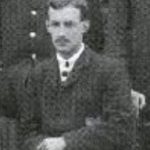 Branch of service: 122nd Brigade. Royal Field Artillery
Branch of service: 122nd Brigade. Royal Field Artillery
Date & place of birth: 15 January 1897 at 81 St George’s Square, London
Date & place of death: 2 April 1917 near Ypres (aged 20) near Ypres
David Carnegie was the grandson of the 9th Earl of Northesk. His father was M.P. for Winchester from 1916 to 1918.
Family background
David Alexander Carnegie was born in St George’s Square, London on 15 January 1897, the younger son of Lieutenant-Colonel the Hon. Douglas Carnegie, and his wife Margaret Jean Carnegie (née Johnstone-Douglas) of Fair Oak, Rogate.
In 1901, David with his older brother John and younger sister Jean were living with their mother at Rose Hill Cottage, Titchbourne while their father was serving as a Captain in the 3rd Battalion Gloucester Regiment at the South Raglan Barracks in Devonport.
 While the family was still living at Rose Hill Cottage in 1911, David was at boarding school at Gresham’s School, Holt, Norfolk having previously attended St. Aubyn’s at Rottingdean. In his final year at Gresham’s School he was Head of his House, a School prefect, captain of the School rugby XV and of the Hockey XI. Although he obtained a place at King’s College, Cambridge he did not go into residence, instead going to the Royal Military Academy at Woolwich.
While the family was still living at Rose Hill Cottage in 1911, David was at boarding school at Gresham’s School, Holt, Norfolk having previously attended St. Aubyn’s at Rottingdean. In his final year at Gresham’s School he was Head of his House, a School prefect, captain of the School rugby XV and of the Hockey XI. Although he obtained a place at King’s College, Cambridge he did not go into residence, instead going to the Royal Military Academy at Woolwich.
By the time David joined the Army, he was living at Woodlands Lodge, Southampton. His father had retired and was the MP for Winchester and John, his elder brother was a 2nd Lieutenant in the Hampshire Carabiniers.
Military service
Having been a Sergeant in the Officer Training College, David joined the army on leaving school and after passing through Woolwich he was commissioned into the Royal Field Artillery on 10 May 1916. His battery was in action throughout the Battles of the Somme.
Death and commemoration
David Alexander Carnegie was killed on 2 April 1917, at the occupation of Elverdinghe Chateau near Ypres, killed by the same shell that hit his Major. His C.O. praised David for his reliability and his exceptional powers of observation and intuition. Howson had described him in his Woolwich application as a “strong quiet leader … distinctly above the average”.
He is buried at the Ferme-Olivier Cemetery near Ypres. Plot 3. Row C.Grave 2 and commemorated on the Rogate War Memorial.
Sources
Some material obtained from the Gresham School at War website